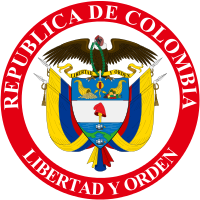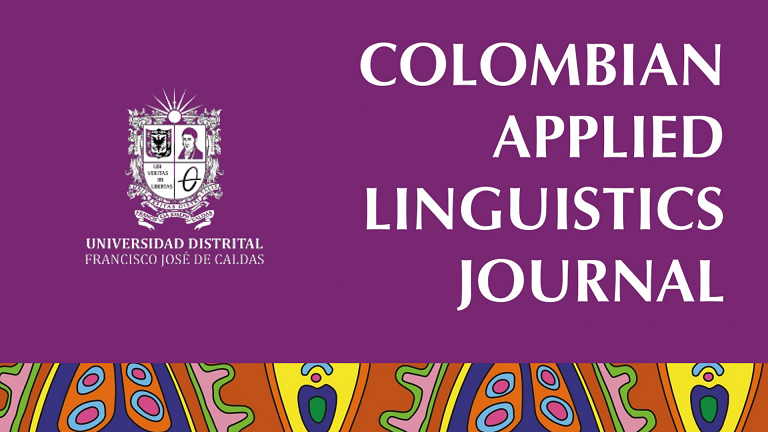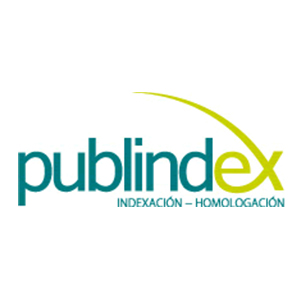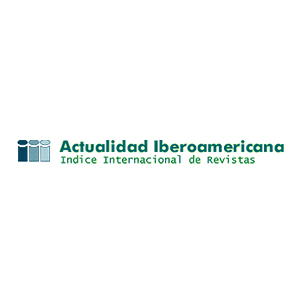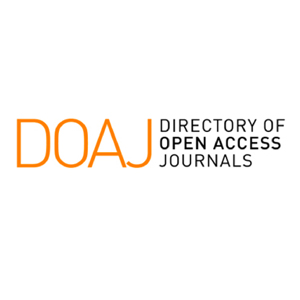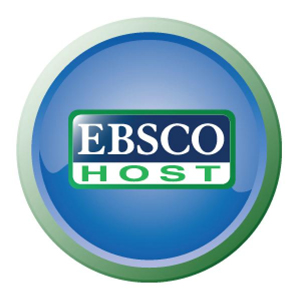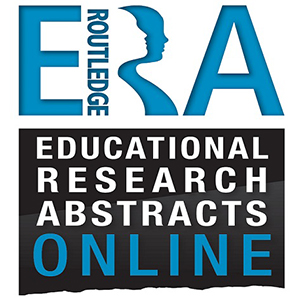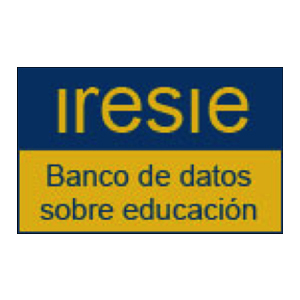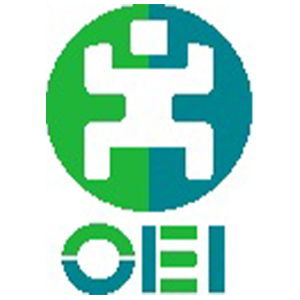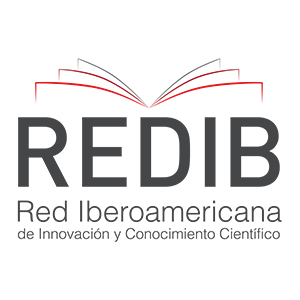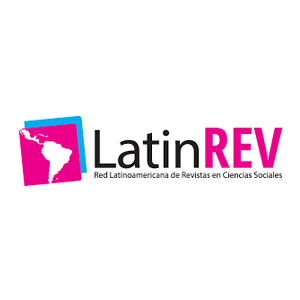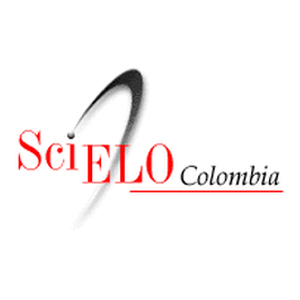Teacher Identity in Language Pedagogy. A Narrative Perspective from Two Colombian Teacher Educators’ Experience
Identidad docente en pedagogía de la lengua. Una perspectiva narrativa desde la experiencia de dos formadores de docentes colombianos
Identidade docente na pedagogia da linguagem. Uma perspectiva narrativa a partir da experiência de dois formadores de professores colombianos
Este artículo da cuenta de la indagación de las identidades y la pedagogía de dos profesores de idiomas a través de seis conversaciones en un período de seis meses, en dos universidades de Bogotá, Colombia. Al adoptar una perspectiva no-metodológica, este estudio recurre a la noción de narrativa para documentar experiencias sobre la pedagogía del lenguaje e inspeccionar cómo las nociones tradicionales pero estáticas de las identidades docentes y la pedagogía del lenguaje se configuran y reconfiguran a través de la práctica pedagógica. Por lo tanto, los hallazgos revelaron que los profesores de inglés cuestionan las construcciones de identidad marginales y hegemónicas mediante la promulgación de su concepción pedagógica. Como resultado, se exponen modos alternativos de ser y hacer como mecanismo para existir y resignificar lo que ha sido la pedagogía del lenguaje en el campo de la enseñanza del idioma inglés.
lenguaje, pedagogía, investigación narrativa, identidad docente (es)
linguagem, pedagogia, pesquisa narrativa, identidad docente (pt)
Al-Khatib, A. J., & Lash, M. J. (2017). Professional identity of an early childhood black teacher in a predominantly white school: A case study. Child Care in Practice, 23(3), 242–257. https://doi.org/10.1080/13575279.2016.1188766
Almazloum, M. (2018). Pedagogical grammar: Learners’ beliefs do matter. International Journal of Language and Linguistics, 5(3), 41-53.https://doi.org/10.30845/ijll.v5n3p4
Aman, R. (2014). Why interculturalidad is not interculturality. Colonial remains and paradoxes in translation between indigenous social movements and supranational bodies. Cultural Studies, 29(2), 205–228. https://doi.org/10.1080/09502386.2014.899379
Andreotti, V. (2011). Actionable postcolonial theory in education. Palgrave Macmillan US.
Anzaldúa, G. (2009). The Gloria Anzaldua reader. Duke University Press. https://doi.org/10.1515/9780822391272
Archanjo, R., Barahona, M., & Finardi, K. R. (2019). Identity of foreign language pre-service teachers to speakers of other languages: Insights from Brazil and Chile. Colombian Applied Linguistics Journal, 21(1), 62-75. https://doi.org/10.14483/22487085.14086
Arias-Cardona, A. M., & Alvarado-Salgado, S. V. (2015). Investigación narrativa: apuesta metodológica para la construcción social de conocimientos científicos. Revista CES Psicología, 8(2), 171-181.
Arroyo-Ortega, A. y Alvarado Salgado, S. V. (2016). Conocimiento en co-labor: reflexiones y posibilidades para la construcción de paz. Universitas: Revista de Ciencias Sociales y Humanas, 14(25), 121-148. https://doi.org/10.17163/uni.n25.2016.07
Barkhuizen, G. (Ed.) (2017). Reflections on language teacher identity research. Routledge.
Battiste, M. (2002). Indigenous knowledge and pedagogy in First Nations education: A literature review with recommendations. National Working Group on Education.
Beijaard, D., Meijer, P. C., & Verloop, N. (2004). Reconsidering research on teachers’ professional identity. Teaching and Teacher Education, 20(2), 107–128. https://doi.org/10.1016/j.tate.2003.07.001
Castañeda-Peña, H. (2018). Structuralist, poststructuralist and decolonial identity research in English language teaching and learning: A reflection problematizing the field. In H.
Castañeda-Peña et al. (2018), elt local research agendas i (pp. 17-35). Universidad Distrital Francisco José de Caldas.
Connelly, F. M., & Clandinin, D. J. (2006). Narrative inquiry. In J. L. Green, G. Camilli, & P. Elmore (Eds.), Handbook of complementary methods in education research (3rd ed., pp. 477–487). Lawrence Erlbaum. De Sousa-Santos, B. (2010). Descolonizar el saber, reinventar el poder. Ediciones Trilce.
De Sousa-Santos, B. (2018). Introducción a las epistemologías del sur. In M. Meneses & K. Bidaseca (Eds.), Epistemologías del Sur: Epistemologias do Sul (pp.25-62). Clacso.
Díaz, C. (2006). Subjetividad docente y resistencias culturales: entre la constricción instrumental y la posibilidad del sentido como creación. Actualidades Pedagógicas, 48, 95-103.
Escobar-Gómez, M. (2019). Decolonial responsibility within international higher education: Institutional commitment and resistance strategies. Voces y Silencios. Revista Latinoamericana de Educación 10(1), 113-126. https://doi.org/10.18175/vys10.1.2019.09
Esteva, G. (2015). Para sentipensar la comunalidad. Bajo el Volcán, 15(23), 171-186.
Fandiño, Y. (2013). Knowledge base and EFL teacher education programs: A Colombian perspective. Íkala, Revista de Lenguaje y Cultura, 18(1), 83-95.
Fang, F. (2018). Native-speakerism revisited: Global Englishes, ELT, and intercultural communication. Indonesian Journal of English Language Teaching, 13(2), 115-129. http://dx.doi.org/10.25170%2Fijelt.v13i2.1175
Freire, P. (2000). Pedagogy of the oppressed. 30th-anniversary ed. Continuum.
Garcia, O. (2019). Decolonizing foreign, second, heritage, and first languages. Implications for education. In D. Macedo (Eds.), Decolonizing foreign language education. The misteaching of English and other colonial languages (pp. 152-168). Routledge.
García, O., & Li, W. (2014). Translanguaging: Language, bilingualism and education. Palgrave Macmillan.
Granados-Beltrán, C. (2016). Critical interculturality. A path for pre-service ELT Teachers. Íkala, 21(2), 169- 185. https://doi.org/10.17533/udea.ikala.v21n02a04
Granados-Beltrán, C. (2018). Revisiting the need for critical research in undergraduate Colombian English language teaching. HOW Journal, 25(1), 174-193. https://doi.org/10.19183/how.25.1.355
Grosfoguel, R. (2010). Para descolonizar os estudos de economia política e os estudospós-coloniais: transmodernidade, pensamento de fronteira e colonialidade global. In B. de Sousa-Santos, M. P. Meneses (Orgs.). Epistemologias do sul (pp. 455-491). Cortez..
Grosfoguel, R. (2011). Decolonizing postcolonial studies and paradigms of political-economy: Transmodernity, decolonial thinking, and global coloniality. TRANSMODERNITY: Journal of Peripheral Cultural Production of the Luso-Hispanic World, 1(1), 1-38. https://doi.org/10.5070/T411000004
Haber, A. (2011). Nometodología payanesa: Notas de metodología indisciplinada (con comentarios de Henry Tantalean, Francisco Gil García y Dante Angelo). Revista Chilena de Antropología, 23(1), 9-49. https://doi.org/10.5354/rca.v0i23.15564
Hofmann, S. G., Grossman, P., & Hinton, D. E. (2011). Loving-kindness and compassion meditation: Potential for psychological interventions. Clinical Psychology Review, 31(7), 1126–1132. https://doi.org/10.1016/j.cpr.2011.07.003
Hsu, F. (2017). Resisting the coloniality of English: A research review of strategies. The CATESOL Journal, 29(1), 111-132.
Khan, S. (2005). Re-configuring the native informant: Positionality in the global age. Signs, 30(4), 2017–2035.
Khoja-Moolji, S. (2017). The making of humans and their others in and through transnational human rights advocacy: Exploring the cases of Mukhtar Mai and Malala Yousafzai. Signs, 42(2), 377–402.
Kobul, M. K., & Saraçoğlu, İ. N. (2020). Foreign language teaching anxiety of non-native pre-service and in-Service EFL teachers. Journal of History, Culture & Art Research /Tarih Kültür ve Sanat Arastirmalari Dergisi, 9(3), 350–365.https://doi.org/10.7596/taksad.v9i3.2143
Kumaravadivelu, B. (2006). Dangerous liaison: Globalization, empire and TESOL. In J. Edge (Ed.), (Re)locating TESOL in an age of empire (pp. 1–26). Palgrave Macmillan.
Kumaravadivelu, B. (2012). Language teacher education for a global society. A modular model for knowing, analyzing, recognizing, doing, and seeing. Routledge.
Kumaravadivelu, B. (2016). The decolonial option in English teaching: Can the subaltern act? TESOL Quarterly, 50(1), 66-85.
Liu, Y., & Xu, Y. (2011). Inclusion or exclusion? A narrative inquiry of a language teacher’s identity experience in the “new work order” of competing pedagogies. Teaching and Teacher Education, 27, 589–597.
Maldonado-Torres, N. (2007). On the coloniality of being. Cultural Studies, 21(2-3), 240-270. https://doi.org/10.1080/09502380601162548
Mastrella-de-Andrade, M., & Pessoa, R. R. (2019). A critical, decolonial glance at language teacher education in Brazil: On being prepared to teach. DELTA: Documentação de Estudos em Lingüística Teórica e Aplicada, 35(3), 1-28.
Mason, S. L., & Chik, A. (2020). Age, gender and language teacher identity: Narratives from higher education. Sexuality & Culture, 24(4), 1028–1045. https://doi.org/10.1007/s12119-020-09749-x
Meschini, P., & Porta, L. (2017). Introducción a la colección. En L. Porta y M. Yedaide, Pedagogía(s) Vital(es). Cartografías del pensamiento y gestos ético-políticos en perspectiva descolonial. Colección Indisciplina(s). Edem.
Mignolo, W. (2003). Historias locales/diseños globales. Akal Ediciones.
Mignolo, W. (2007). DELINKING. Cultural Studies, 21(2), 449-514. https://doi.org/10.1080/09502380601162647
Mignolo, W. (2009). Epistemic disobedience, independent thought and decolonial freedom. Theory, Culture & Society, 26(7–8), 159–181. https://doi.org/10.1177/0263276409349275
Mignolo, W. (2010). Delinking: The rhetoric of modernity, the logic of coloniality and the grammar of decoloniality. In W. Mignolo & A. Escobar (Eds.), Globalization and the decolonial option (pp. 303–368). Routledge.
Mignolo, W., & Walsh, K. (2018). On Coloniality. Duke University Press.
Moreno-Medrano, L. M., & Corral-Guillé, G. (2019). Metodologías inductivas interculturales para una pedagogía decolonial. Sinéctica, 52, 1–20. https://doi.org/10.31391/s2007-7033(2019)0052-003
Moya, P. M. L. (2011). Who we are and from where we speak. transmodernity: Journal of Peripheral Cultural Production of the Luso-Hispanic World, 1(2).
Mustafina, R. F., Ilina, M. S., & Shcherbakova, I. A. (2020). Emotions and their effect on Learning. Utopía y Praxis Latinoamericana, 25, 318–324.
Nasheeda, A., Abdullah, H. B., Krauss, S. E., & Ahmed, N. B. (2019). Transforming transcripts into stories: A multimethod approach to narrative analysis. International Journal of Qualitative Methods. https://doi.org/10.1177/1609406919856797
Núñez-Pardo, A. (2020a). Inquiring into the coloniality of knowledge, power, and being in EFL textbooks. HOW Journal, 27(2), 113-133. https://doi.org/10.19183/how.27.2.5
Núñez-Pardo, A. (2020b). A critical reflection on developing and implementing in-house EFL textbooks. Revista Papeles, 11(21), 11-31. https://doi.org/10.54104/papeles.v11n21.581
Ortiz-Ocaña, A., & Arias-López, M. (2019). Hacer decolonial: desobedecer a la metodología de investigación. Hallazgos, 16(31), 147-166.
Ortiz-Ocaña, A., Arias-López, M. I., & Pedrozo-Conedo, Z. E. (2018). Hacia una pedagogía decolonial en/desde el sur global. Revista nuestrAmérica, 6(12), 195-222. https://doi.org/10.2307/j.ctv1t8c2w
Palermo, Z. (Ed.). (2015). Des/decolonizar la universidad. Del Signo.
Patel, L. (2016). Decolonizing educational research: From ownership to answerability. Routledge. https://doi.org/10.4324/9781315658551
Pennycook, A. (2008). English and the Discourses of Colonialism. The politics of language. Routledge.
Pirskanen, H., Jokinen, K., Karhinen-Soppi, A., Lämsä, T., Notko, M., Otani, M., Meil, G., Romero-Balsas, P., & Rogero-García, J. (2019). Children’s emotions in educational settings: Teacher perceptions from Australia, China, Finland, Japan and Spain. Early
Childhood Education Journal, 47(4), 417–426. https://doi.org/10.1007/s10643-019-00944-6
Restrepo, E., & Rojas, A. (2010). Inflexión decolonial. Fuentes, conceptos y cuestionamientos. Editorial Universidad del Cauca.
Richards, J., & Rodgers, T. (2014). Approaches and methods in language teaching. Cambridge.
Rico, C. (2012). Language teaching materials as mediators for icc development: A challenge for materials developers. Signo y Pensamiento, 30, 130-154. https://doi.org/10.11144/Javeriana.syp30-60.melp
Rivas-Flores, J. I., Márquez-García, M. J., Leite-Méndez, A. & Cortés-González, P. (2020). Narrativa y educación con perspectiva decolonial. Márgenes, Revista de Educación de la Universidad de Málaga, 1(3), 46-62. https://doi.org/10.24310/mgnmar.v1i3.9495
Sharkey, J. (2012). Community-based pedagogies and literacies in language teacher education: Promising.beginnings, intriguing challenges. Íkala, Revista de Lenguaje y Cultura, 17(1), 9-13.
Shum, M. S., Tai, C. P., & Shi, D. (2018). Using ‘Reading to Learn’ (R2L) pedagogy to teach discussion genre to non-Chinese-speaking students in Hong Kong. International Journal of Bilingual Education & Bilingualism, 21(2), 237–247. https://doi.org/10.1080/13670050.2016.1159653
Soto-Molina, J. E., & Méndez, P. (2020). Linguistic colonialism in the English language textbooks of multinational publishing houses. HOW Journal, 27(1), 11-28. https://doi.org/10.19183/how.27.1.521
Stone-Mediatore, S. (2003). Reading across borders - Storytelling and knowledge of resistence. Palgrave Macmillan.
Syed, M., & Nelson, S. C. (2015). Guidelines for establishing reliability when coding narrative data. Emerging Adulthood, 3(6), 375–387. https://doi.org/10.1177/2167696815587648
Torres-Rocha, J. C. (2019). EFL teacher professionalism and identity: Between local/global ELT tensions. HOW Journal, 26(1), 153-176. https://doi.org/10.19183/how.26.1.501
Tosuncuoğlu, İ. (2017). Non-native & native English teachers. Journal of History, Culture & Art Research/ Tarih Kültür ve Sanat Arastirmalari Dergisi, 6(6), 634–638. https://doi.org/10.7596/taksad.v6i6.573
Ubaque-Casallas, D., & Castañeda-Peña, H. (2020). Nonnormative corporalities and transgender identity in English as a Foreign Language student teachers. HOW Journal, 27(2), 13-30. https://doi.org/10.19183/how.27.2.548
Ubaque-Casallas, D., & Castañeda-Peña, H. (2021). “I’m here and I am queer”. Queer teacher identities in ELT. A Colombian Study. Folios, (53). 91-105. https://doi.org/10.17227/folios.53-11291
Usma, J. (2009). Education and language policy in Colombia: Exploring processes of inclusion, exclusion, and stratification in times of global reform. Profile Issues in Teachers Professional Development, 11(1), 123-141.
Varghese, M., Morgan, B., Johnston, B., & Johnson, K. A. (2005). Theorizing language teacher identity: three perspectives and beyond. Journal of Language Identity and Education 4(1), 21–44.
Walsh, C. (2007). Shifting the geopolitics of critical knowledge. Cultural Studies, 21(2-3), 224-239. https://doi.org/10.1080/09502380601162530
Walsh, C. (2013). Pedagogías decoloniales. Prácticas insurgentes de resistir, (re)existir y (re)vivir. Tomo i. Ediciones Abya-Yala.
Walsh, C. (2017). Pedagogías decoloniales. Prácticas insurgentes de resistir, (re)existir y (re)vivir. Tomo ii. Ediciones Abya-Yala.
Walsh, C., Oliveira, L. F. de, & Candau, V. M. (2018). Coloniality and decolonial pedagogy: To think of other education. Education Policy Analysis Archives, 26(83), 1-11. https://doi.org/10.14507/epaa.26.3874
Yedaide, M. M., Alvarez, Z., & Porta, L. (2015). La investigación narrativa como moción epistémico-política. Revista Científica Guillermo de Ockham, 13(1), 27-35.
Zabala, M. (2016). Decolonial methodologies in education. In M. A. Peters (Ed.), Encyclopedia of Educational Philosophy and Theory. Springer Science + Business Media Singapore.
Zembylas, M. (2003). Caring for teacher emotion: reflections on teacher self development. Studies in Philosophy and Education, 22(2), 103–125.
APA
ACM
ACS
ABNT
Chicago
Harvard
IEEE
MLA
Turabian
Vancouver
Descargar cita
Citaciones

1. Jhon Eduardo Mosquera Pérez, Flor Angela Hurtado Torres, Daniel Elias Pérez Diaz. (2023). English Language Teacher Researcher Identity Construction: A Collaborative Autoethnography. GIST – Education and Learning Research Journal, 26 https://doi.org/10.26817/16925777.1544.
Métricas PlumX
Visitas
Descargas
Recibido: 14 de septiembre de 2021; Aceptado: 13 de febrero de 2023
Abstract
This paper accounts for the inspection of two language teachers' identities and language pedagogy through six conversations in a sixth-month period at two universities in Bogotá, Colombia. By adopting a no-methodology perspective, this study resorts to the notion of narrative to document language pedagogy experiences and inspect how the traditional, yet static notions of teacher identities and language pedagogy, are configured and re-configured through the pedagogical practice. Therefore, findings revealed that English language teachers contest marginal and hegemonic identity constructions through enacting their pedagogy conception. As a result, alternative ways of being and doing are exposed as a mechanism to exist and re-signify what language pedagogy has meant in the English language teaching field.
Keywords:
teacher identity, language, pedagogy, narrative research.Resumo
Este artigo relata a inspeção das identidades e da pedagogia de dois professores de línguas através de seis conversas em um período de seis meses, em duas universidades de Bogotá, Colômbia. Ao Adotar uma perspectiva não metodológica, este estudo baseia-se na noção de narrativa para documentar experiências sobre a pedagogia da linguagem e para inspecionar como as noções tradicionais, mas estáticas, de identidades de professores e pedagogia da linguagem são moldadas e remodeladas por meio da prática pedagógica. Portanto, os achados revelaram que os professores de inglês questionam as construções de identidades marginais e hegemônicas por meio da promulgação da sua concepção pedagógica. Como resultado, expõem-se os modos alternativos de ser e fazer como um mecanismo para existir e redefinir o que a pedagogia da linguagem tem sido no campo do ensino de língua inglesa.
Palavras-chave:
identidade docente, linguagem, pedagogia, pesquisa narrativa.Resumen
Este artículo da cuenta de la indagación de las identidades y la pedagogía de dos profesores de idiomas a través de seis conversaciones en un período de seis meses, en dos universidades de Bogotá, Colombia. Al adoptar una perspectiva no-metodológica, este estudio recurre a la noción de narrativa para documentar experiencias sobre la pedagogía del lenguaje e inspeccionar cómo las nociones tradicionales pero estáticas de las identidades docentes y la pedagogía del lenguaje se configuran y reconfiguran a través de la práctica pedagógica. Por lo tanto, los hallazgos revelaron que los profesores de inglés cuestionan las construcciones de identidad marginales y hegemónicas mediante la promulgación de su concepción pedagógica. Como resultado, se exponen modos alternativos de ser y hacer como mecanismo para existir y resignificar lo que ha sido la pedagogía del lenguaje en el campo de la enseñanza del idioma inglés.
Palabras clave:
identidad docente, lenguaje, pedagogía, investigación narrativa.Introduction
Language Teacher Identities (LTIS) have been kept alive as a reflection of the "[English Language Teaching] ELT theories and practices that emanate from the former colonial powers" (Pennycook, 2008, p. 19). Without a doubt, this reflection still permeates English Language Teachers (ELTS) ways of knowing, doing, and being. For Núñez-Pardo (2020a), "[both] teachers and students should make critical sense of such domination dynamics that shape identities, knowledge, and self-directed actions" (p. 119). However, such a sense-making activity cannot happen if ELTS do not become aware of the complicity role in the reproductions of epis-temic (Andreotti, 2011) and ontological violence they enact, consciously or unconsciously, in their teaching practices.
For instance, pre-packed instructional practices continue to be shared in the field as the only means to teach (Richards & Rodgers, 2014). However, as these have been mobilized and installed through notions such as method, methodology, teaching strategies, and learning strategies, among others; they have functioned as a colonial strategy to standardize curricular plans, material (Kumaramadivelu, 2016), and by all means, the teachers' language pedagogy (LP). Thus, although the epistemological control is apparent, there is also ontological dominance over LTIS. Such dominance is evident as "identity in the ELT field has been mainly an epistemological construction [...] subjected to fixed categories in which [teacher's subjectivities have] not been taken into account when it comes to identity formation" (Ubaque-Casallas & Castañeda-Peña, 2020, p. 17).
Accordingly, since there is evident onto-epistemological colonialism in the ELT (Torres-Rocha, 2019), I consider LP is a bridge to understanding LTIS. These have started to be explored from other epistemological and ontological borders (see, Ubaque-Casallas & Castañeda-Peña, 2020, 2021) that consider LP as means to challenge the instrumental conception that has "decontextualized [the multiple] forms of being in the field of teaching, [installing] a single and monolithic idea of the language teacher and a single and fixed idea of the language student" (Castañeda-Peña, 2018, p. 18). As such, it seems fundamental to continue fostering a space of reflection to understand how LP allows the enactment of a multiplicity of ways of knowing, doing, and being Otherwise.
This study intends to add a differential lens to understand how English language teachers (ELTS) enact their LP conception and contest marginal and hegemonic identity constructions. Thus, this aims to trigger a broader discussion regarding the importance of re-signifying LP in the ELT field.
Theoretical considerations
Coloniality and being in the ELT
Coloniality and decoloniality are increasingly becoming critical terms for the Colombian ELT. For those interested in exploring LTIS far from enunciative colonial strategies, it has been fundamental to acknowledge that being in the field is rooted in a colonial narrative that subalterns ELTS (Kumaravadivelu, 2012). Nevertheless, to move forward and engage in an alternative thinking activity in which being and doing in the field can be named, not from linguistic-knowledge base frames, it is fundamental to explore LTIS, "from below and from within" (Escobar, 2010, p. 393). This means exploring the different experiences, voices, and subjectivities embodied in teaching.
Being in this study means to exist; therefore, it is critical to say that ELTS' existence has been tied to a "dehumanization, which marks not only those whose humanity has been stolen but also [though in a different way] those who have stolen it" (Freire, 2000, p. 44). With this, I refer to the subtraction of our ELTS' subjectivities by imposing a subaltern condition from which ELTS have been built as inferior or non-human (Restrepo & Rojas, 2010). Due to the colonial narrative I referred to, ELTS have become abstract subjects. Thus, their race, gender, sex, body, and identity have been replaced and filled with contents of what to do, what to teach, and who to be.
Consequently, as ELTS have been constructed, educated, and understood without their subjectivities, it is pivotal to investigate LTIS through LP. This attempt regards LP as a pathway to document the various and multiple means ELTS contest coloniality imposed by the knowledge system configured in the ELT (Maldonado-Torres, 2007).
Language Teacher identities
Identity is not an easy term to define, nor can it be easy to specify what LTIS could be. Nevertheless, there seems to be some agreement on which LTI is. It appears to be "a stand-alone construct, [...] largely been viewed as a composite of various other constructs such as race, gender, 'native speaker' status, religion, sexuality, and class" (Mason & Chik, 2020, p. 1029). No matter what those various constructs are, definitions seem far from encapsulating where these identities speak from (Grosfoguel, 2011); this is if we assume that "LTIS are [about] being and doing, [conditioned by] feeling and imagining, and [constructed and reconstructed in] storying" (Barkhuizen, 2017, p. 4).
Arguably, the ELT field has, primarily until now, constructed LTIS in the singular. For instance, LTIS are tied to the idea of the native speaker. For Tosuncuoğlu (2017), native speakers are in a prestigious position from which they have regulated knowledge and being within the field. This notion has called the attention of scholars who argue that this evident colonialism is worth exploring and contesting as it has influenced ELTS' identities and teaching practices (Soto-Molina & Méndez, 2020). Therefore, LTIS, in the plural, are a decolonial narrative that: 1) intersect with the personal and particular location within global structures (Anzaldúa, 2009); and 2) are not outside the established hierarchies of the modern/colonial capitalist/ patriarchal world-system (Grosfoguel, 2011).
Therefore, to understand how ELTS contest marginal and hegemonic identity constructions, usually banned and subalternized, it is necessary to explore LP as this embodies their identities.
Language pedagogy
Pedagogy is an umbrella term to describe a canon or frame of knowledge. For Walsh (2007), "the problem is not with the existence of such frames but rather with the ways they have historically worked to subordinate and negate "other" frames, "other" knowledge, and "other" subjects and thinkers" (p. 224). When it comes to ELT, such frames have imposed some hierarchies that have made invisible other types of learning and teaching identities (Castañeda-Peña, 2018). Moreover, these frames have contributed to subjecting pedagogy to neo-colonial principles in which language is positioned "as an instrument of domination [...] built as an object of desire" (Mignolo, 2003, p. 331). This has meant a top-down approach that regards pedagogy as a mechanism for merely transmitting instrumental and functional teaching knowledge.
As a result of this lineal logic, LP has been oriented towards instrumental and technical teaching approaches. For instance, one can find some examples of instrumental language pedagogies in the literature available. Shum et al. (2018) worked on a Reading to Learn Pedagogy to teach the discussion genre to non-Chinese-speaking students. Almazloum (2018) talks about a pedagogy of grammar that seeks to describe criteria for language learning. With this, I do not mean to promote any hierarchical construct of good or bad pedagogy but acknowledge that LP and knowledge emerging from it have been mostly tied to acquiring skills. This has resulted in a hegemonic construction of unique knowledge, an ideal being, and a universal doing that has diminished and weakened ELTS' agency, something relevant "in reducing inequalities" (Archanjo et al., 2019, p. 73).
Consequently, if "language pedagogy has an ethical goal that goes into the construction of intersubjective meanings that help us both to understand ourselves" (Granados-Beltrán, 2018, p. 175); it is relevant to look for a process of "re-signification and re/construction" (Escobar, 2010, p. 397) to detach from hegemonic and instrumental views. This would permit ELTS to raise new purposes and break away from the same terms (Mignolo, 2010, p. 313), from which we have understood LP.
Context of the study
This study opened space to converse with Augusto and Eron (not their real names), two ELTS who work at two public universities in Bogotá, Colombia. Augusto is a PH.D. in Education and Eron holds a MA in Applied Linguistics. Also, they have more than twelve years of experience teaching English in multiple and varied educational contexts. Although their professional background is relevant to the study, the main reason they participated in a six-month study was their interest in sharing their narratives as ELTS to help me understand how they enacted their LP conception and to what extent they contest marginal and hegemonic identity constructions. Both were welcomed to participate since they were colleagues who were more than willing to share their teaching experiences as educators. This was considered a perspective from the personal and the institution regarding LP and LTIS in different scenarios. However, this perspective does not mean that their voices represent the objectives of the programs they work for or that their narratives are an objective understanding of their programs' approaches. Still, they represent a personal reading that starts from their pedagogical practice and their particular location as university teachers of English.
No-methodology
Thinking about methodology is a problem of modernity. Therefore, I would not like to call forth this category, but to name how this study challenges such a colonial genealogy (Patel, 2016) by resorting to a no-methodology. Consequently, I echo Haber (2011), who claims that:
No-methodology is to follow all those possibilities that the path forgets, that the protocol obstructs, that the method represses [...] it is a conversation with the subaltern subjects, or with the subaltern side of the subjects, that is, with the semi-praxis that grows on the other side of the things enunciated by the hegemonic language. (pp. 29-30)
With this, I commit to finding a methodological and epistemological rupture in which this study "becomes an ethical and political bet of those [like me] who want to rethink the forms of traditional research" (Arroyo-Ortega & Alvarado-Salgado, 2016, p. 138). This argument acknowledges that "educational research should not lurch to uniformly adopting a particular epistemic stance, or approach, particularly while so few are fluent with the echoes and ongoing structure of [...] colonialism" (Patel, 2016, p. 64).
Although employing narratives may, for some (Connelly & Clandinin, 2006), constitute a methodological approach by itself, assuming a no-methodology implies "putting what has been lived into words, as ideas and emotions; re-signify experiences, fill with meaning" (Arias-Cardona & Alvarado-Salgado, 2015, p. 172). As such, when I refer to narratives as a no-methodology, I insinuate that I adopt an "epistemological, political, ideological and moral positioning [...] a project for the future according to models of coexistence based on plurality, diversity, and solidarity." (Rivas-Flores et al., 2020, p. 48).
Accordingly, I start from conversations with Augusto and Eron since these challenge the colonial master narratives (Zabala, 2016) installed in the ELT. It is worth noting that these conversations happened once a month for six months. To keep track of our reflections and involvement in the co-construction of the experiences, I transcribed each one as soon as possible. This allowed me to dwell on Augusto's and Eron's feelings, histories, and personal meanings shared in the conversations. Usually carried out in canonical research, this process did not intend to systematize "data." Instead, it was coherent with the ethical and ideological position of the study in which "the narrative is not exclusive to any scientific tradition, nor to its paradigmatic foundation" (Yedaide et al., 2015, p. 30), and therefore, it is not tied to any universalist and objectivist claim to be achieved.
All conversations were put together in a matrix of indexation that I created to add a differential lens to understand how ELTS enact their LP conception and contest marginal and hegemonic identity constructions. Although such a matrix may, for some, not fit into the lens of the no methodology approach this study adopted, it was more a tool to make evident the ruptures and epistemological cracks through which Augusto and Eron enunciated their Otherwise. I believe this matrix served as an analytical space to approach the intimacy of the reported conversations. However, I did not look for codes or properties (Syed & Nelson, 2015); alternatively, I attempted to inhabit conversations. Such an approach acknowledged that "who we are and from where we speak is highly relevant for the intellectual projects we are likely to pursue" (Moya, 2011, p. 79). Therefore, as individuals, we can "claim epistemic authority as well as to counter the objectified, dehumanized representations of [ouserselves]" (Stone-Mediatore, 2003, p. 150).
That being said, I embraced the narrative as my own no-methodology approach. This, in essence, permitted me to break away from the rigid logic of scientific theories to embrace "the ambiguities, plurivalences and hybrid consistency of the most intuitive or explanatory theories" (Yedaide et al., 2015, p. 31) that merge and occur when conversating and existing with the other.
Constructions and reflection upon experiences
This study resorted to experiences from conversations with Augusto and Eron. Their voices were seen as an alleyway to contest "the way of knowing, legitimized, admitted, to the various ways of knowing" (Vasilachis de Gialdino, 2012, p. 11). Here, conversations acquired an alterative nature (Ortiz-Ocaña & Arias-López, 2019) since they abandoned the claim of investigative subjectivation (Haber, 2011) and hierarchies among those who participated. Instead, we, Augusto, Eron, and I, engaged in an exchange of voices, in "a respectful and supportive dialogue, with affection, between equals, without the decolonial mediator [who] is the only person who asks "(Ortiz-Ocaña & Arias-López, 2019, p. 14). This served as a mechanism for recognizing the other as the possessor of knowledge Other.
In this study, I detached myself from narrative extractives and the traps of methodological impositions. This is why I must say that although some scholars stamp informed consent as embedded in the violence of universalized colonial epistemological regimes (Khan, 2005; Mignolo, 2009), as they are nested in the West's rationality, I decided to adopt it to guarantee the privacy of my conversations with Augusto and Eron. It became an ethical resource to control the experiences that I hereafter disclose. Therefore, I believe any consent form becomes an instrument to reclaim research agency for those who converse, far from being a mechanism of epistemological control. Moreover, I also chose to transcribe verbatim, not to control Augusto's and Eron's voices, but to allow a closer reflection upon their experiences. In this respect, since "there is no single procedure that can be claimed as 'best' for analyzing narratives [.] [there are] a set of strategies that can be employed depending on how the researcher chooses to represent [experiences]" (Nasheeda et al., 2019, p. 2).
Accordingly, as I intend to represent experiences as intimate conversations, I proposed dialogue to understand how Augusto and Eron enacted their LP conception and contested marginal and hegemonic identity constructions. In so doing, identity construction accounts from Augusto and Eron's pedagogical practices were inspected to recover LP as this is a mechanism of unlearning, learning, and relearning (Escobar-Gómez, 2019) about LTIS.
Augusto's narrative
In conversing about LP, Augusto began by speaking about his experience as a teacher in TEPS. He narrated that he has experienced different contexts that have made him modify who he is and how he thinks as teacher. The following excerpt opens a path to reflect upon this:
My English teaching experience has been a bit changing. Let us say that when I graduated with my undergraduate degree, I graduated with a bit of vision; it was a bit static or linguistic about what language teaching is. I did not see or know other teaching dimensions that were not teaching grammar, or contextualizing the language. In this case, I am an English teacher or have been an English teacher. Then that perception accompanied me until I started my master's degree. There I met people and other things that helped me reconsider and reorient those visions toward other fields. These other unexplored territories have enabled me to re-configure that vision of instrumental teaching to a more contextualized one, a more sensitive to the particularities of contexts. [sic]
Although "pedagogy and all that is pedagogical [should] go beyond the instrumental sense of teaching and transmitting knowledge" (Walsh, 2013, p. 29), Augusto reveals the instrumental roots that have constructed LP in his experience. In a broader scenario, this argument is echoed by Granados-Beltrán (2018), who claims that language pedagogy "is [until now] focused on the meeting of standards which represent a certain level of acquisition of that skill" (p. 175). For example, we have witnessed how even English textbooks have been instrumentalized in the ELT field. These reproduce fixed notions of teaching that barely go beyond grammar structures (Rico, 2012; Núñez-Pardo, 2020b). Augusto narrates that when he graduated from his bachelor's program, he had assumed this grammar-structure approach as his own construction of LP, as books were the primary source for his teaching approach.
LP has been framed under foreign methodologies that disregard the particularities of local contexts where English is learned and taught (Kumaravadivelu, 2016). Interestingly, Augusto contemplates the importance of sharing with others and their perspectives to move away from such a conformist way of action (De Sousa-Santos, 2010). Thereby, it is then needed to embrace a more ecological view of LP in which action toward anti-rational and decolonial ends can be enacted (Khoja-Moolji, 2017). Moreover, it is pertinent to reconsider and reorient visions that construct LTIS. In his own words: that helped me to reconsider, reorient those visions that I had towards other fields, other unexplored territories that have enabled me to re-configure that vision of instrumental teaching to a more contextualized one, a more sensitive to the particularities of contexts.
Augusto's words also bring forth a worth exploring idea, the notion of context. To delve into Augusto's narration about particularities of contexts, I must first consider that although LTI, in the singular, is a dynamic and shifting concept (Zembylas, 2003), "the formation, negotiation, and growth of teacher identity is a fundamentally social process taking place in institutional settings" (Varghese et al., 2005, p. 39). With this, I seek to set eyes on contexts as spaces in which LTIS, in the plural, are constructed. The following excerpt allows a more in-depth inspection of Augusto's experience:
Also, this allowed me to think in the macro context of the society in which we live. Since that, in one way or another, is linked to the teaching of language learning, in other words, learning and teaching are socio-political practices that can change what we do and what we are and from which we cannot escape; thus, we do not know them, they are there in some way or another. I said previously that it is a path of discovery that I have not finished discovering. In this new perspective, the dynamics are so varied and rich in information that they escape my essential vision before language teaching. Now, it is more fluid, more dynamic, and more unpredictable, which makes this new way of teaching more interesting, or I have a new vision of teaching the language, right? Contexts also play an essential role; it is not the same to say teaching English in a more mercantile institute to teaching it, for example, in a university, with teachers in training who are going to be language teachers or teach it in a district school or a university, public school. [sic]
For Augusto, instrumentalized notions of teaching are not sensitive to broader social contexts. In this respect, Augusto claims that as contexts are linked to language teaching, any LP should reflect socio-political practices that, to some extent, may function as a means to transform teaching processes and subjectivities. When referring to a post-method pedagogy, Kumaravadivelu (2012) thinks of a three-dimensional system made up of three pedagogic parameters: "particularity, practicality, and possibility" (pp. 12-15). These parameters seem to interact with each other in a synergic relationship. As for the parameter of particularity, it states that any language pedagogy should be context-sensitive (Kumaravadivelu, 2012). Therefore, context particularities may become a rupture to trigger LTIS and LP Otherwise.
In the literature available, it can be found, for example, "community-based pedagogies [these are] [...] curriculum and practices that reflect knowledge and appreciation of the communities in which schools are located, and students and their families inhabit" (Sharkey, 2012, p. 1). Moreover, these pedagogies are context-sensitive since they foster a bottom-up approach to thinking of it as the center of the pedagogy. Such a lens is perhaps what Augusto advocates. The following excerpt allows me to elaborate on this assumption:
Contexts have much to do with the extension of the broad conception one has about pedagogy. Some contexts give you more mobility to those perceptions, those ideas of language teaching that I comment. For example, I come from a context where grammar was a priority. Currently, I continue in a context where this idea is quite strong. We follow this teaching philosophy concept or methodology to teach language, which is the vision of pedagogy. However, in some other contexts, the student is the priority. Each context inserts, imposes or even allows you to teach differently if you think about it. I believe these dynamics emerge from and converge better with how one sees or conceives as an educator. I also think that pedagogy is a category assigned to our bodies. I mean, if you believe grammar and pronunciation are the most important, you will probably have to speak like a native American and/or British, but no more. We become static, and normative in our views as teachers and individuals, and we lose track of contexts believing that we must be like others to be a teacher. [ sic]
In fact, as "modern/western pedagogy cannot recognize or make visible the differences between human beings, since their formative intention is to homogenize and standardize (Ortiz-Ocaña et al., 2018, p. 200), instrumental conceptions about LP make it a colonizing pedagogy. In this respect, Augusto's linguistic considerations are essential as the ELT world "has experienced various ideological debates [in which] it was taken for granted that English is the property of its native speakers" (Fang, 2018, p. 115). However, in such debates, some authors (see Garcia & Li, 2014) have dared to say that English is a crucial sociopolitical linguistic construct that cannot be linked to named languages (American-British) (García & Li, 2014). Instead, this should work as a fluid construct in which a hegemonic linguistic imposition does not limit English.
Interestingly, Augusto's positioning towards the need to think of contexts to understand LP and LTIS is relevant as this positioning reveals an unquestionable colonial intersection between LP and LTIS. In Augusto's words -we become static, normative in our views as teachers and individuals, and we lose track of contexts believing that we must be like others for being a teacher-. According to poststructuralists, "teacher identity [in the singular] is not a fixed set of attributes" (Al-Khatib & Lash 2017, p. 243); instead, it is a conditional category in constant reconstruction (Liu & Xu, 2011). This lens fails to encapsulate the coloniality in LP and LTIS denounced by Augusto. For instance, suppose ELTS construct self-images rooted in normative-disciplinary categories. In that case, these will "strongly determine the way teachers teach, the way they develop as teachers, and their attitudes toward educational changes" (Beijaard et al., 2004, p. 108).
In my view, since contexts seem to provide ELTS with the possibility to reflect upon their LP and LTIS, ELTS are to begin questioning who they are and what they know. LTIS are either static or changeable. Therefore, as they seem to be reflected and constructed in and through LP, contexts are critical scenarios for ELTS to become aware of their place of enunciation.
Eron's narrative
Moreover, in conversing about LP, Eron shared that he is now adapting to a new teaching framework in which feelings, emotions, and self-reflection are core categories for the student-teachers he accompanies. This framework has become an attempt to support student and teachers in recognizing the importance of positive, nurturing relationships in education and developing compassion, empathy, and tolerance in their process of becoming student-teachers. This framework seems quite interesting as the tradition in Colombian TEPS has been set over acquiring disciplinary knowledge and skills (Fandiño, 2013).
Eron seems quite hopeful regarding this new approach to education as he is aware of its implications:
I am teaching other new boys from the first semester and second semester, and let us say that I can notice that there is a process of adaptation to this idea of learning through socio-emotional skills with the boys of the first semester and the second or third semester are a little more familiar with it, and they know how to handle it. Aspects like what? Let us say the development of strategies for learning with time management, I do not know, the use of mindfulness, even for certain moments when they are stressed from being there in front of a computer all day. So, in moments of how restorative circles, this of the socio-emotional becomes an exciting practice. For example, we sit down, we all talk about how we feel, that we liked the class we have, it has made it a bit difficult for us and let us say that is what we have done so far. [sic]
Although incorporating emotions into learning is not new (Kobul & Saraçoglu, 2020), most of what has been documented, has been geared toward explaining how emotions may impact learning (Mustafina et al., 2020). There have been many attempts on the importance of cultivating compassion-based behaviors in the educational fields (Hofmann et al., 2011). However, these seem to help regulate emotions in educational settings.
Such a limited lens allows us to consider emotions a critical dimension in one's identity.
Augusto's approach to teacher education opens a path to subvert the vertical foundations student-teachers' seem to encounter in TEPS. As a matter of fact, this perspective is included in almost all the universities' claims present in the profiles they look for or educate. The so-called -Graduate profile1 - gives an account of these characteristics. Therefore, these are foundations that "by breaking the link between the subject of enunciation and the ethnic/ racial/sexual/gender/epistemic place" (Grosfoguel, 2010, p. 459) have distanced them from where they speak and do Otherwise. For example, Mignolo and Walsh (2018) posit the notion of crack to "enable us to re-configure ourselves as subjects outside us/them binary... to construct alternative roads, create new topographies and geographies... look at the world with new eyes, use competing systems of knowledge, and rewrite identities" (p. 83). This would mean to think of this socio-emotional perspective as a rupture in which both teacher educators and student-teachers can navigate their epistemological and ontological conceptions to construct an alternative notion of teacher education and teacher identity.
The following excerpt opens the room to explore more of the rupture above unveiled in conversation with Eron:
There is a project for the university to become precisely that, in a place where the socio-emo-tional has relevance, and well speaking from the point of view purely, let us say, of the academic curriculum, of training, and the achievement of educational objectives are preserved let us say, aspects such as teacher evaluation, assessment, both formative and summative. So, let us say that those go hand in hand with each other, then let us say there are two aspects, the systematization of these socio-emotional education practices, giving them a beginning, an end, and some objectives, some methods, a series of practices. At the same time, let us say, from the purely rigorous point of view of the university and because we are in the accreditation process, some teacher evaluations are followed, evaluation processes are followed, and let us say, as I mentioned, formative and summative that go hand in hand with the socio-emotional issue. However, I think all of this is very good since it is seen that it impacts what children are or will be as future professionals. [sic]
This alternative path coexists with traditional models of teacher education. For instance, Eron makes evident that this attempt to build on socioemotional education articulates aspects such as assessment and evaluation. Even though the former may not be seen as essential for the latter, as socioemotional education is not added to any professional curriculum as a fundamental area or skills to be developed, both have a defined objective when educating student-teachers. We cannot deny that in TEPS, student-teachers' agency has been reduced by the standardization of language teachers (Usma, 2009). However, this approach to teacher education seems to be a crack from which students' subjectivities may be constructed in coexistence with canonical teacher education notions, in which emotions are not contemplated.
Pirskanen et al., (2019) argue that "emotions are always shaped, named, evaluated and interpreted in a given social and cultural context. [and this is why] emotional experiences have an interactive, relational character" (p. 418) that should be considered in teacher education. In this respect, Eron also claims that such coexistence will impact student-teachers in the future. For instance, Hsu (2017) argues that there are possible pedagogical paths that teachers can choose against the colonial forms of English teaching. If student-teachers can change the power relations they find themselves marginalized (Kumaravadivelu, 2016), the same colonial foundations of teacher education can become more fluid and dynamic to think of LTIS from non-disciplinary discourses.
In my view, to confront the logic of coloniality that has set the roots for language teacher education, there must be an openness to decentering epistemological foundations in the ELT field and an openness to reclaim ELTS' subjectivities. Consequently, as Walsh et al. (2018, p. 6) put it, there must be included in any pedagogical practice a more straightforward meaning of a decolonial pedagogy "[that] is forged in the perspective of intervening in the reinvention of society, in the politicization of pedagogical action, proposing to unlearn what has been learned and to challenge the epistemic structures of coloniality."
The narrative that Eron exposes shows the coexistence between hegemonic notions of teacher education and the interest in developing socio-emo-tional skills among student and teachers seems to open a space to construct an ecology of knowledges (de Sousa-Santos, 2018). Such a paradigm advocates for articulating the possibilities of epistemological pluralism within the ELT field. Nevertheless, it also shows a significant distance from traditional approaches in teacher education. The following excerpt allows a more in-depth inspection of this assumption:
In my student days, the linguistic standard was a British or American standard. You have to learn the structures and these academic contents; there is a cultural, literary, and linguistic component. However, be careful; I do not care how you assume it or learn it; it is how it is, right? You will be a vehicle of knowledge to transmit this university learning how it is. Now, let us say that has changed a bit; for example, with the arrival of critical thinking and many socio-emotional skills, students are given high priority in what they feel, what they think, and how. They assume learning. It could be said that they are allowed to feel, which seems important to me since it is something that is in us, but what has been done until now has been somewhat forgotten because we only think about the best possible teaching method. [ sic]
In this narrative, Eron positions a critical decolonial path where there is an evident change in how teacher education is conceived. This path echoes Kumaramadivelu (2016), who argued that a "method functions as an operating principle shaping all other aspects of language education: curriculum, materials, testing, and training" (p. 73). A principle that has positioned vertical and instrumental notions about pedagogy and teacher education, and that by all means compels those who want to delink from this colonial root to reject "a homogeneous, know-it-all epistemol-ogy on language teaching and learning" (Mastrella-de-Andrade & Pessoa, 2019, p. 9). Therefore, even though the ELT field and TEPS have witnessed "one method after another rollout of Western universities and through Western publishing houses to spread out all over the world" (Kumaravadivelu, 2006, p. 20), Eron distances from this legacy by opening a space for student teachers to feel.
Then, feeling is the category that has also been removed from student-teachers' subjectivities in TEPS until now. When it comes to decolonial pedagogies, what Eron narrates could open up new possibilities to advance in reflections on other possible ways of knowing (Walsh, 2013) and feeling (Esteva, 2015). Feeling can then allow spaces to understand alternative ways of being in the field and, in so doing, enrich learning and teaching processes in TEPS.
Final thoughts
Acknowledging that decolonial pedagogies follow a path towards in-discipline (Meschini & Porta, 2017) means recognizing that these aim to delink from the assumption of pedagogy as a scientific discipline subjected to the instrumental lens of knowledge. Consequently, to think of LTIS and LP Otherwise, we as educators, must first think of the pedagogical paradigm to be able to reflect upon the importance of "knowing how to build, from below and collaboratively, other [paths] that are more meaningful and that allow spaces to understand alternative ways of knowing" (Moreno-Medrano, & Corral-Guillé, 2019, p. 2).
Therefore, conclusions drawn in this study are to be understood not as definite findings but as the result of exposing the intimacy of conversations about identity and language pedagogy. As such, such an intimacy depicts how two ELTS enacted their LP conception and contested marginal and hegemonic identity constructions.
First, this study encourages ELTS to delink (Mignolo, 2007) from a fixed and mono-disciplinary understanding of teacher identity and LP. As Aman (2014) states:
Delinking is a route to a decolonial alternative; that is, a dedication to the constitution of alternative modes of modernization by bringing to the fore knowledge systems that have been colonized and delegitimized, but which nonetheless facilitate moving outside the logics of modernity. (p. 211)
Therefore, this invites us to think, to do, and to be, pedagogically speaking, Otherwise. With this, I propose a dialogue in which language pedagogy is tied to its disciplinary function (the language as a system) and recognizes that pedagogy embodies our subjectivities. As such, it is, therefore, a mechanism to mobilize and visualize our existence. Simply put, we must begin by "acknowledging complexities and tensions among different subjectivities in the current world is the key element of an ethical and political decolonial project" (Granados-Beltrán, 2016, p. 184).
Second, conversations that are reported here, open a space to think that LP and LTIS should inform Teacher Education Programs (TEPS) in Colombia. TEPS were founded on hegemonic Euro-American-centric values that, even nowadays, influence and shape models of knowledge (Battiste, 2002). Not paradoxically, language TEPS have been immersed in dynamics of power. They function as colonial machinery of the nation-state configuration in as much as "language has been used as a tool of domination, conquest, and colonization throughout history" (García, 2019, p. 152). As a result, ELT'S and student teachers have become both static and unwitting in their own epistemic beliefs, as has educational research also been tethered to this colonizing root. Therefore, to open a broader path in TEPS, it is necessary to begin, as Palermo (2015) proposes, "modifying themes, content, approaches, and styles of transmission, that is, a series of dimensions of education that we naturalize and, therefore, we consider inescapable" (p. 141).
Lastly, teacher identity is enacted in and through LP and vice-versa. Therefore, although "[we] teachers must recognize the plurality and diversity of ways of living, being, being, thinking of our students, in order not to incur in these exclusive actions in which coloniality [operates] in some of its dimensions" (Ortiz-Ocaña et al., 2018, p. 199), it is also necessary to acknowledge that such a plurality implies a myriad of LP; pedagogies that, as Walsh (2017) puts it, should open cracks, detachments, and new hooks. This means that, as Augusto and Eron made it evident, any understanding of identity and LP must derive from a personal repositioning in which LP can contain a character of resistance and alternativeness (Díaz, 2006).
Licencia
Derechos de autor 2023 Folios

Esta obra está bajo una licencia internacional Creative Commons Atribución-NoComercial 4.0.
Todo el trabajo debe ser original e inédito. La presentación de un artículo para publicación implica que el autor ha dado su consentimiento para que el artículo se reproduzca en cualquier momento y en cualquier forma que la revista Folios considere apropiada. Los artículos son responsabilidad exclusiva de los autores y no necesariamente representan la opinión de la revista, ni de su editor. La recepción de un artículo no implicará ningún compromiso de la revista Folios para su publicación. Sin embargo, de ser aceptado los autores cederán sus derechos patrimoniales a la Universidad Pedagógica Nacional para los fines pertinentes de reproducción, edición, distribución, exhibición y comunicación en Colombia y fuera de este país por medios impresos, electrónicos, CD ROM, Internet o cualquier otro medio conocido o por conocer. Los asuntos legales que puedan surgir luego de la publicación de los materiales en la revista son responsabilidad total de los autores. Cualquier artículo de esta revista se puede usar y citar siempre que se haga referencia a él correctamente.

